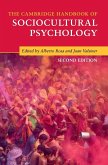The Cambridge Handbook of Forensic Psychology
Herausgeber: Brown, Jennifer M.; Horvath, Miranda A. H.
The Cambridge Handbook of Forensic Psychology
Herausgeber: Brown, Jennifer M.; Horvath, Miranda A. H.
- Gebundenes Buch
- Merkliste
- Auf die Merkliste
- Bewerten Bewerten
- Teilen
- Produkt teilen
- Produkterinnerung
- Produkterinnerung
This new edition updates the go-to reference for forensic psychologists. It serves as a companion volume for doctoral candidates in the field and a refresher for established practitioners wanting to continue their professional development in policing, prisons, and special hospital or community practices working with a diverse range of clients.
Andere Kunden interessierten sich auch für
![The Cambridge Handbook of Creativity and Emotions The Cambridge Handbook of Creativity and Emotions]() The Cambridge Handbook of Creativity and Emotions235,99 €
The Cambridge Handbook of Creativity and Emotions235,99 €![The Cambridge Handbook of Wisdom The Cambridge Handbook of Wisdom]() The Cambridge Handbook of Wisdom187,99 €
The Cambridge Handbook of Wisdom187,99 €![The Cambridge Handbook of Sociocultural Psychology The Cambridge Handbook of Sociocultural Psychology]() The Cambridge Handbook of Sociocultural Psychology193,99 €
The Cambridge Handbook of Sociocultural Psychology193,99 €![The Cambridge Handbook of Technology and Employee Behavior The Cambridge Handbook of Technology and Employee Behavior]() The Cambridge Handbook of Technology and Employee Behavior179,99 €
The Cambridge Handbook of Technology and Employee Behavior179,99 €![The Cambridge Handbook of Creativity across Domains The Cambridge Handbook of Creativity across Domains]() The Cambridge Handbook of Creativity across Domains102,99 €
The Cambridge Handbook of Creativity across Domains102,99 €![The Cambridge Handbook of International Prevention Science The Cambridge Handbook of International Prevention Science]() The Cambridge Handbook of International Prevention Science264,99 €
The Cambridge Handbook of International Prevention Science264,99 €![The Cambridge Handbook of the Psychology of Aesthetics and the Arts The Cambridge Handbook of the Psychology of Aesthetics and the Arts]() The Cambridge Handbook of the Psychology of Aesthetics and the Arts62,99 €
The Cambridge Handbook of the Psychology of Aesthetics and the Arts62,99 €-
-
-
This new edition updates the go-to reference for forensic psychologists. It serves as a companion volume for doctoral candidates in the field and a refresher for established practitioners wanting to continue their professional development in policing, prisons, and special hospital or community practices working with a diverse range of clients.
Hinweis: Dieser Artikel kann nur an eine deutsche Lieferadresse ausgeliefert werden.
Hinweis: Dieser Artikel kann nur an eine deutsche Lieferadresse ausgeliefert werden.
Produktdetails
- Produktdetails
- Verlag: Cambridge University Press
- Seitenzahl: 944
- Erscheinungstermin: 9. November 2021
- Englisch
- Abmessung: 250mm x 175mm x 55mm
- Gewicht: 1775g
- ISBN-13: 9781108494977
- ISBN-10: 1108494978
- Artikelnr.: 62214825
- Herstellerkennzeichnung
- Libri GmbH
- Europaallee 1
- 36244 Bad Hersfeld
- gpsr@libri.de
- Verlag: Cambridge University Press
- Seitenzahl: 944
- Erscheinungstermin: 9. November 2021
- Englisch
- Abmessung: 250mm x 175mm x 55mm
- Gewicht: 1775g
- ISBN-13: 9781108494977
- ISBN-10: 1108494978
- Artikelnr.: 62214825
- Herstellerkennzeichnung
- Libri GmbH
- Europaallee 1
- 36244 Bad Hersfeld
- gpsr@libri.de
Preface; Forensic psychology: ten years on Jennifer M. Brown and Miranda A.
H. Horvath; Part I. Psychological Underpinnings: 1.1 Cognitive theories of
crime Clive R. Hollin; 1.2 Child and adolescent offending Elizabeth
Paddock, Shihning Chou and Kevin Browne; 1.3 Investigative psychology C.
Gabrielle Salfati; 1.4 Neurological theories Hope Kent, Huw Williams and
James Tonks; 1.5 Personality Sean Hammond and Vincent Egan; 1.6 Theories of
sexual offending Jacinta R. Cording and Tony Ward; 1.7 The psychology of
violent behaviour Andrew Welsh; 1.8 Investigative decision-making Rebecca
Howman, Marie Eyre and Laurence Alison; Part II. Psychology and Criminal
Behaviour: 2.1 Current understandings of sex-based harassment and stalking
perpetration Thomas E. Page and Adrian Scott; 2.2 The behaviour of sex
offenders Kari Davies, Heather Flowe and Theresa Ferraz-da-Silva; 2.3
Intimate partner violence Elizabeth Gilchrist; 2.4 Acquisitive crime Helen
Gavin; 2.5 Terrorism research: current issues and debates Margaret A.
Wilson; 2.6 Online child sexual exploitation and abuse Ethel Quayle; 2.7
Arson Katarina Fritzon, Sarah Miller and Danielle Perks; 2.8 Serial
killings and mass murder Andreas Kapardis and Sasha Reid; Part III.
Assessment: 3.1 Credibility and investigative interviewing Mark Kebbell and
Rebecca Milne; 3.2 Eyewitness testimony Geralda Odinot, Eva A. J. van
Rosmalen, and Annelies Vredeveldt; 3.3 Psychopathic personality disorder
David J. Cooke; 3.4 Forensic mental health assessments Derek Perkins and
Susannah Hughes; 3.5 Intellectual disabilities and offending behaviour John
L. Taylor and Ian Freckleton; 3.6 Head injury and offending Thomas M.
McMillan; 3.7 Parole decision-making: contemporary practice and challenges
Ralph C. Serin and Kaitlyn Wardrop; 3.8 Risk and dangerousness in adults
Martin Rettenberger, Grant T. Harris, Marnie E. Rice and Reinhard Eher;
Part IV. Interventions: 4.1 Forensic mental health interventions Emily
Glorney; 4.2 Restorative justice: drawing from the old to develop new
justice alternatives Mark Briskey; 4.3 Treatment of persons with sexual
offence histories Kristina Shatokhina and Leigh Harkins; 4.4 Strength-based
approaches to addiction recovery and desistance from crime: broadening the
base for community engagement Steve Broome and David Best; 4.5 Victimology
and victim interventions Sandra Walklate; 4.6 Interventions with violent
offenders Devon L. L. Polaschek; 4.7 Women offenders Joanne Belknap and
Jacqueline Mora Manzo; 4.8 Preventing delinquency and later criminal
offending Brandon C. Welsh, David P. Farrington and Alexis Yohros; Part V.
Civil Proceedings: 5.1 Court decisions about the upbringing of children
Aoife Daly and Aisling Parkes; 5.2 Parenting Christine Puckering; 5.3
Immigration, asylum seekers and refugees Nora Honkala; 5.4 Occupational
stress and traumatic stress Paula Brough, Amanda Biggs, Briana Brandon and
Victoria Follette; 5.5 Capacity and consent in the criminal and civil
contexts Ailbhe O'Loughlin; Part VI. Professional Practices: 6.1 Courtroom
testimony in cases of disputed confessions Gisli H. Gudjonsson; 6.2
Evaluating offending behaviour programmes in prison and probation Helen
Wakeling and Rosie Travers; 6.3 Working effectively with multicultural
offenders in a clinical context Stephane Shepherd, Arran Rose and Mary
Madu; 6.4 Professional training and accreditation Geraldine O'Hare, Andrew
Day, Randy Otto and Laura Guy; 6.5 Ethics Simon Duff and James McGuire; 6.6
Forensic case formulation Leam A. Craig and Martin Rettenberger; 6.7 Staff
supervision in forensic contexts Jason Davies.
H. Horvath; Part I. Psychological Underpinnings: 1.1 Cognitive theories of
crime Clive R. Hollin; 1.2 Child and adolescent offending Elizabeth
Paddock, Shihning Chou and Kevin Browne; 1.3 Investigative psychology C.
Gabrielle Salfati; 1.4 Neurological theories Hope Kent, Huw Williams and
James Tonks; 1.5 Personality Sean Hammond and Vincent Egan; 1.6 Theories of
sexual offending Jacinta R. Cording and Tony Ward; 1.7 The psychology of
violent behaviour Andrew Welsh; 1.8 Investigative decision-making Rebecca
Howman, Marie Eyre and Laurence Alison; Part II. Psychology and Criminal
Behaviour: 2.1 Current understandings of sex-based harassment and stalking
perpetration Thomas E. Page and Adrian Scott; 2.2 The behaviour of sex
offenders Kari Davies, Heather Flowe and Theresa Ferraz-da-Silva; 2.3
Intimate partner violence Elizabeth Gilchrist; 2.4 Acquisitive crime Helen
Gavin; 2.5 Terrorism research: current issues and debates Margaret A.
Wilson; 2.6 Online child sexual exploitation and abuse Ethel Quayle; 2.7
Arson Katarina Fritzon, Sarah Miller and Danielle Perks; 2.8 Serial
killings and mass murder Andreas Kapardis and Sasha Reid; Part III.
Assessment: 3.1 Credibility and investigative interviewing Mark Kebbell and
Rebecca Milne; 3.2 Eyewitness testimony Geralda Odinot, Eva A. J. van
Rosmalen, and Annelies Vredeveldt; 3.3 Psychopathic personality disorder
David J. Cooke; 3.4 Forensic mental health assessments Derek Perkins and
Susannah Hughes; 3.5 Intellectual disabilities and offending behaviour John
L. Taylor and Ian Freckleton; 3.6 Head injury and offending Thomas M.
McMillan; 3.7 Parole decision-making: contemporary practice and challenges
Ralph C. Serin and Kaitlyn Wardrop; 3.8 Risk and dangerousness in adults
Martin Rettenberger, Grant T. Harris, Marnie E. Rice and Reinhard Eher;
Part IV. Interventions: 4.1 Forensic mental health interventions Emily
Glorney; 4.2 Restorative justice: drawing from the old to develop new
justice alternatives Mark Briskey; 4.3 Treatment of persons with sexual
offence histories Kristina Shatokhina and Leigh Harkins; 4.4 Strength-based
approaches to addiction recovery and desistance from crime: broadening the
base for community engagement Steve Broome and David Best; 4.5 Victimology
and victim interventions Sandra Walklate; 4.6 Interventions with violent
offenders Devon L. L. Polaschek; 4.7 Women offenders Joanne Belknap and
Jacqueline Mora Manzo; 4.8 Preventing delinquency and later criminal
offending Brandon C. Welsh, David P. Farrington and Alexis Yohros; Part V.
Civil Proceedings: 5.1 Court decisions about the upbringing of children
Aoife Daly and Aisling Parkes; 5.2 Parenting Christine Puckering; 5.3
Immigration, asylum seekers and refugees Nora Honkala; 5.4 Occupational
stress and traumatic stress Paula Brough, Amanda Biggs, Briana Brandon and
Victoria Follette; 5.5 Capacity and consent in the criminal and civil
contexts Ailbhe O'Loughlin; Part VI. Professional Practices: 6.1 Courtroom
testimony in cases of disputed confessions Gisli H. Gudjonsson; 6.2
Evaluating offending behaviour programmes in prison and probation Helen
Wakeling and Rosie Travers; 6.3 Working effectively with multicultural
offenders in a clinical context Stephane Shepherd, Arran Rose and Mary
Madu; 6.4 Professional training and accreditation Geraldine O'Hare, Andrew
Day, Randy Otto and Laura Guy; 6.5 Ethics Simon Duff and James McGuire; 6.6
Forensic case formulation Leam A. Craig and Martin Rettenberger; 6.7 Staff
supervision in forensic contexts Jason Davies.
Preface; Forensic psychology: ten years on Jennifer M. Brown and Miranda A.
H. Horvath; Part I. Psychological Underpinnings: 1.1 Cognitive theories of
crime Clive R. Hollin; 1.2 Child and adolescent offending Elizabeth
Paddock, Shihning Chou and Kevin Browne; 1.3 Investigative psychology C.
Gabrielle Salfati; 1.4 Neurological theories Hope Kent, Huw Williams and
James Tonks; 1.5 Personality Sean Hammond and Vincent Egan; 1.6 Theories of
sexual offending Jacinta R. Cording and Tony Ward; 1.7 The psychology of
violent behaviour Andrew Welsh; 1.8 Investigative decision-making Rebecca
Howman, Marie Eyre and Laurence Alison; Part II. Psychology and Criminal
Behaviour: 2.1 Current understandings of sex-based harassment and stalking
perpetration Thomas E. Page and Adrian Scott; 2.2 The behaviour of sex
offenders Kari Davies, Heather Flowe and Theresa Ferraz-da-Silva; 2.3
Intimate partner violence Elizabeth Gilchrist; 2.4 Acquisitive crime Helen
Gavin; 2.5 Terrorism research: current issues and debates Margaret A.
Wilson; 2.6 Online child sexual exploitation and abuse Ethel Quayle; 2.7
Arson Katarina Fritzon, Sarah Miller and Danielle Perks; 2.8 Serial
killings and mass murder Andreas Kapardis and Sasha Reid; Part III.
Assessment: 3.1 Credibility and investigative interviewing Mark Kebbell and
Rebecca Milne; 3.2 Eyewitness testimony Geralda Odinot, Eva A. J. van
Rosmalen, and Annelies Vredeveldt; 3.3 Psychopathic personality disorder
David J. Cooke; 3.4 Forensic mental health assessments Derek Perkins and
Susannah Hughes; 3.5 Intellectual disabilities and offending behaviour John
L. Taylor and Ian Freckleton; 3.6 Head injury and offending Thomas M.
McMillan; 3.7 Parole decision-making: contemporary practice and challenges
Ralph C. Serin and Kaitlyn Wardrop; 3.8 Risk and dangerousness in adults
Martin Rettenberger, Grant T. Harris, Marnie E. Rice and Reinhard Eher;
Part IV. Interventions: 4.1 Forensic mental health interventions Emily
Glorney; 4.2 Restorative justice: drawing from the old to develop new
justice alternatives Mark Briskey; 4.3 Treatment of persons with sexual
offence histories Kristina Shatokhina and Leigh Harkins; 4.4 Strength-based
approaches to addiction recovery and desistance from crime: broadening the
base for community engagement Steve Broome and David Best; 4.5 Victimology
and victim interventions Sandra Walklate; 4.6 Interventions with violent
offenders Devon L. L. Polaschek; 4.7 Women offenders Joanne Belknap and
Jacqueline Mora Manzo; 4.8 Preventing delinquency and later criminal
offending Brandon C. Welsh, David P. Farrington and Alexis Yohros; Part V.
Civil Proceedings: 5.1 Court decisions about the upbringing of children
Aoife Daly and Aisling Parkes; 5.2 Parenting Christine Puckering; 5.3
Immigration, asylum seekers and refugees Nora Honkala; 5.4 Occupational
stress and traumatic stress Paula Brough, Amanda Biggs, Briana Brandon and
Victoria Follette; 5.5 Capacity and consent in the criminal and civil
contexts Ailbhe O'Loughlin; Part VI. Professional Practices: 6.1 Courtroom
testimony in cases of disputed confessions Gisli H. Gudjonsson; 6.2
Evaluating offending behaviour programmes in prison and probation Helen
Wakeling and Rosie Travers; 6.3 Working effectively with multicultural
offenders in a clinical context Stephane Shepherd, Arran Rose and Mary
Madu; 6.4 Professional training and accreditation Geraldine O'Hare, Andrew
Day, Randy Otto and Laura Guy; 6.5 Ethics Simon Duff and James McGuire; 6.6
Forensic case formulation Leam A. Craig and Martin Rettenberger; 6.7 Staff
supervision in forensic contexts Jason Davies.
H. Horvath; Part I. Psychological Underpinnings: 1.1 Cognitive theories of
crime Clive R. Hollin; 1.2 Child and adolescent offending Elizabeth
Paddock, Shihning Chou and Kevin Browne; 1.3 Investigative psychology C.
Gabrielle Salfati; 1.4 Neurological theories Hope Kent, Huw Williams and
James Tonks; 1.5 Personality Sean Hammond and Vincent Egan; 1.6 Theories of
sexual offending Jacinta R. Cording and Tony Ward; 1.7 The psychology of
violent behaviour Andrew Welsh; 1.8 Investigative decision-making Rebecca
Howman, Marie Eyre and Laurence Alison; Part II. Psychology and Criminal
Behaviour: 2.1 Current understandings of sex-based harassment and stalking
perpetration Thomas E. Page and Adrian Scott; 2.2 The behaviour of sex
offenders Kari Davies, Heather Flowe and Theresa Ferraz-da-Silva; 2.3
Intimate partner violence Elizabeth Gilchrist; 2.4 Acquisitive crime Helen
Gavin; 2.5 Terrorism research: current issues and debates Margaret A.
Wilson; 2.6 Online child sexual exploitation and abuse Ethel Quayle; 2.7
Arson Katarina Fritzon, Sarah Miller and Danielle Perks; 2.8 Serial
killings and mass murder Andreas Kapardis and Sasha Reid; Part III.
Assessment: 3.1 Credibility and investigative interviewing Mark Kebbell and
Rebecca Milne; 3.2 Eyewitness testimony Geralda Odinot, Eva A. J. van
Rosmalen, and Annelies Vredeveldt; 3.3 Psychopathic personality disorder
David J. Cooke; 3.4 Forensic mental health assessments Derek Perkins and
Susannah Hughes; 3.5 Intellectual disabilities and offending behaviour John
L. Taylor and Ian Freckleton; 3.6 Head injury and offending Thomas M.
McMillan; 3.7 Parole decision-making: contemporary practice and challenges
Ralph C. Serin and Kaitlyn Wardrop; 3.8 Risk and dangerousness in adults
Martin Rettenberger, Grant T. Harris, Marnie E. Rice and Reinhard Eher;
Part IV. Interventions: 4.1 Forensic mental health interventions Emily
Glorney; 4.2 Restorative justice: drawing from the old to develop new
justice alternatives Mark Briskey; 4.3 Treatment of persons with sexual
offence histories Kristina Shatokhina and Leigh Harkins; 4.4 Strength-based
approaches to addiction recovery and desistance from crime: broadening the
base for community engagement Steve Broome and David Best; 4.5 Victimology
and victim interventions Sandra Walklate; 4.6 Interventions with violent
offenders Devon L. L. Polaschek; 4.7 Women offenders Joanne Belknap and
Jacqueline Mora Manzo; 4.8 Preventing delinquency and later criminal
offending Brandon C. Welsh, David P. Farrington and Alexis Yohros; Part V.
Civil Proceedings: 5.1 Court decisions about the upbringing of children
Aoife Daly and Aisling Parkes; 5.2 Parenting Christine Puckering; 5.3
Immigration, asylum seekers and refugees Nora Honkala; 5.4 Occupational
stress and traumatic stress Paula Brough, Amanda Biggs, Briana Brandon and
Victoria Follette; 5.5 Capacity and consent in the criminal and civil
contexts Ailbhe O'Loughlin; Part VI. Professional Practices: 6.1 Courtroom
testimony in cases of disputed confessions Gisli H. Gudjonsson; 6.2
Evaluating offending behaviour programmes in prison and probation Helen
Wakeling and Rosie Travers; 6.3 Working effectively with multicultural
offenders in a clinical context Stephane Shepherd, Arran Rose and Mary
Madu; 6.4 Professional training and accreditation Geraldine O'Hare, Andrew
Day, Randy Otto and Laura Guy; 6.5 Ethics Simon Duff and James McGuire; 6.6
Forensic case formulation Leam A. Craig and Martin Rettenberger; 6.7 Staff
supervision in forensic contexts Jason Davies.








